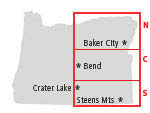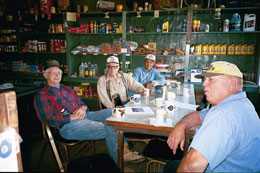







 |
 |
 |
 |
 |
 |
 |
 |
 
Imnaha tavern |
Kids, Dogs & Rattlesnake Skins: Imnaha I am as far away in northeastern Oregon as I can get, taking a detour on my way home from my mother's 85th birthday in Baker City with a need to drive, alone and far away. Leaving the highway and the high shelf overlooking Idaho and the magnificent Snake River canyon, the road descends into the next ravine pinched between the Wallowa Mountains and Hell's Canyon bench. It is thirty-one miles down a narrow gravel road along the Imnaha River to the town of Imnaha. There are five and ten mile stretches without a sign of civilization. Just me, the road, the river, a few pine trees, then cabins tucked in the woods, or remote farms with rocking chairs on porches, beautiful gardens of zinnias and corn, sunflowers bowing their heads at summer's end. Chickens wander in the road and horses meander in lush pastures. A cow crosses the road, looking at me with wonder as only a cow can. Big-eyed and blank. You can almost see the neurons trying to connect, yet before they do, I am gone. It is Sunday September 16th 2001, only five days after the unspeakable. My loved ones in New York and D.C. are safe and accounted for, but I am wounded, like everyone. There are a few pickups on the dusty gravel road, some carrying horse trailers, some with kids & dogs in the back. It is an exquisite sunny Sunday with hints of autumn in the air. It is an ordinary road passing ordinary sights. My windows are down and I have chosen Willie Nelson to guide me along. It is as normal as life can be, yet I can turn a corner and burst into tears. The sight of these farms, the voice of Willie, the pickups, kids and dogs, even the scrawny rooster crossing the road has new meaning now. New tenderness. Every house is flying the American flag. Most of the pickups have a flag on the antennae, a couple of trucks have flags draped along the side. I am on a simple American road, remote and nearly inaccessible, but I have joined a silent, poignant parade. After about 25 miles the road changes from gravel to asphalt and in a few minutes I am in downtown Imnaha, population 18. There is only one place open (well, there's only one place period, besides the post office) — the market/tavern — and from the looks of all the pickups and cars filling the parking lot and the street, all eighteen must be in the tavern, plus a good many hunters and tourists. I too, feel the need to stop, even though I am on my way to a bed and breakfast inn about five miles out of town. The building, a remnant from 1910 or 1920, is packed. Every ancient wooden stool at the bar is taken, the wood booths are overflowing with families. People are standing and leaning against the walls. Food looks untouched. It is hushed and reverent. Faces are lifted upwards. All eyes are on CNN. The television is mounted high on the wall at the far end of the bar, making some people contort, craning their necks almost backwards to get a view. It is a Norman Rockwell scene at the turn of the newest century. It is a bizarre juxtaposition, a moment suspended in time, the new caught in the unchanged trappings of the old. I've walked unnoticed into it. The walls are covered with advertisements of another age: rattlesnake skins piled on a low shelf next to canned soup and boxes of crackers, a freezer at the back with a rattlesnake count listing names of locals hand-written on butcher paper in crayon, keeping ongoing tallies. On the TV the towers fall again. I place my Pepsi on the counter with a dollar and the bartender rings it up on the old cash register without taking her eyes off the screen. I disappear as easily as I had materialized, feeling as if I say anything everything will disappear like a pinprick in a bubble. It's a pleasant drive downriver to the Imnaha River Inn, a seven-room bed and breakfast overlooking the river, and I am happy to be met by an old dog. A cat sleeps on the wide porch. Sandy and Nick Vidan's lodge-like home that they built themselves is gorgeous in that rustic lodge way warm and welcoming. Sandy opens the huge wooden door, standing barefoot in shorts and a t-shirt with wet hair, looking as though she'd just stepped out of the shower, which she had. She had forgotten I was coming. She is apologetic but in these days, it is no matter. Sandy and I spend the evening drinking wine and sitting on the porch talking and waiting for her husband Nick and his friend to return from hunting. The warm wind whispers down the canyon walls, a lightning storm builds behind us to the north. For the first time since Tuesday, I feel relaxed, gathering energy and strength. No longer weary and numb and shattered. I don't sleep this night, safe in bed, alive. It seems like I watch the sky all night. So many stars. Brilliant suspended. I am awake when the sky turns pre-dawn haunted blue, when the first limn of sunlight hits the high edge of the rimrock above the canyon. I hear the river, and then hear gravel crunching ever so slightly as Nick's truck rolls down the driveway before he starts the engine, so as not to wake me. Sandy is in the kitchen. I smell coffee and bacon. I will get up in a while, but first I will lie here and watch the sun slip down the canyon walls, oblivious. back to Northeastern Oregon overview
|